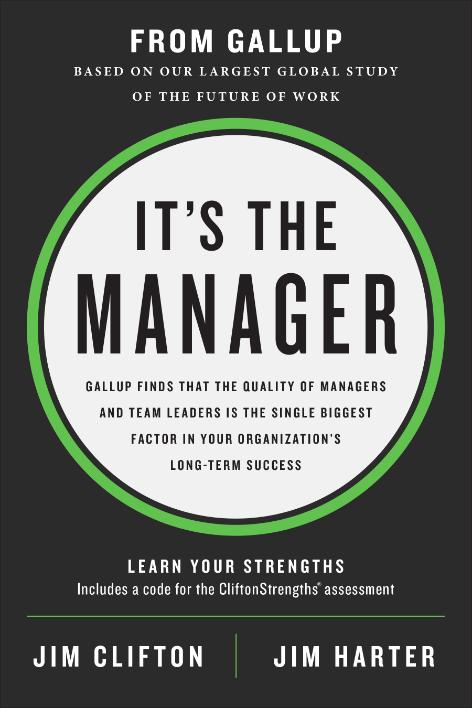Story Highlights
- Stakeholder value has replaced shareholder value as a business focus
- Great jobs lead to great lives and better business outcomes
- The Gallup Q12 can help leaders create a culture of engagement
The rules of business were rewritten last week.
The Business Roundtable, an organization that currently includes 192 American CEOs from some of the biggest companies in the world, scrapped its view that the primary purpose of business is to increase shareholder profits.
According to the 181 signatories of the August 2019 statement, businesses "share a fundamental commitment to all of our stakeholders," which now include customers, employees, suppliers and communities as well as shareholders.
It's a laudable sentiment, and achieving these new aims would have an extraordinarily positive impact on individuals, businesses and the economy. But as every member of the Business Roundtable assuredly knows, accomplishing anything depends on defining terms, setting goals and measuring progress.
Simply, the members of the Roundtable need new metrics. Their best option is to use the method proven to impact their abruptly expanded list of stakeholders: the Q12.
This is what the Q12 was made to do.
Gallup's Q12 assessment measures employees' psychological and emotional attachment to their employer. Gallup evaluated hundreds of different workplace elements during its decades of research, which included 35 million employees in hundreds of industries and in thousands of companies around the world -- but scientists determined there are only 12 elements that encapsulate the qualities that create employee engagement.
The assessment casts those elements in the form of statements -- 12 of them, obviously -- and asks employees for their level of agreement with each one on a five-point Likert scale. Those who strongly agree are fully engaged; those who strongly disagree are actively disengaged.
Years of subsequent independent testing proved the validity of this engagement framework, as well as certain facts the Business Roundtable needs to know: Engaged workers are happier, healthier people. They're more productive employees and create more profitable businesses. They align with their company's mission or purpose and with its ethical beliefs. They boost earnings per share. They create customer engagement every day in ways even they might not realize.
In short, the Q12 measures every aspect of the new rules of business. But measuring engagement doesn't improve it. To engage workers, leaders have to build workplace cultures that sustain it.
This is what Gallup recommends:
Focus on engagement at the local level. Company leaders set the tone, but managers create the ecosystems that foster engagement. According to Gallup's bestselling book, It's the Manager, 70% of the variance in employee engagement scores is due to local managers. Engagement initiatives must therefore be aimed at the workgroup level, and managers must be empowered to respond to the engagement needs of their teams, whatever they are.
Select the right managers. People management requires talent, and the best managers Gallup has ever studied are noticeably different from the rest. Businesses that scientifically select managers for their unique talents greatly increase their probability of overall team engagement and have been found to achieve an average 27% higher revenue per employee than work units with less talented managers. And companies that commit to engaging their managers increase employee engagement by 59%.
Coach and develop managers. When it comes to engaging employees, the actual work happens after the assessment. Managers create engagement through ongoing action-planning meetings, in one-on-one conversations and by interpreting the small gestures that indicate what employees need to feel engaged. To do any of that, managers must learn how to operationalize engagement -- to reach employees emotionally, to coach individual performance and to remove the barriers that make engagement difficult or impossible to maintain. Ongoing development is key to managers' performance improvement.
Leaders must define engagement in real-life terms. Though managers must be held accountable for their team's engagement, leaders must define what success looks like at every level -- executive, managerial and individual contributor -- with real-life descriptions in words everyone understands. For instance, the first Q12 statement is "I know what is expected of me at work." Only six in 10 U.S. employees can strongly agree with that most fundamental aspect of work, and just 36% of managers strongly agree they have a clear job description -- which may help explain why only a third of U.S. employees are engaged, indicating an epidemic lack of clarity in U.S. workplaces. It's up to leaders to make their values and processes clear, especially as they apply to engagement.
What the whole world wants is not enough.
Gallup Chairman and CEO Jim Clifton says that Gallup's biggest discovery is that what the whole world wants is a good job: 30+ hours of work per week and a living-wage paycheck. But good jobs really aren't what the signatories of the Business Roundtable statement are talking about. To accomplish their aims, they need to create great jobs.
Clifton defines that kind of job in his preface to It's the Manager:
"A 'great job' has all the qualities of a good job with one big differentiator: Employees are engaged in meaningful and fulfilling work and feel they are experiencing real individual growth and development in the workplace. People with great jobs have very different life outcomes."
Companies that create great jobs have different business outcomes as well -- higher productivity, profitability, retention and share prices, to name a few. But they also have workers who want to meet or exceed customer expectations, behave fairly and ethically, deliver value, and support their communities.
Cultures of engagement are essential to creating great jobs. Leaders can accelerate engagement in their workplace culture by focusing on individual strengths, leadership development, inclusivity and other attributes. But it all begins with engagement. It all boils down to those 12 essential elements.
For the Business Roundtable to succeed in achieving its commendable aims, businesses must adopt the metrics and methods that improve employee engagement. The 181 Business Roundtable signatories made it exceedingly clear that the rules of business have changed -- but 12 statements, based on decades of scientific research, already tell leaders how to follow them.
Start asking the right questions to turn good jobs into great jobs:
- Make the Gallup Q12 employee engagement survey a foundational part of how your organization does engagement.
- Download State of the American Workplace, a free report about the changing workplace based on data collected from more than 195,600 U.S. employees, 31 million respondents and leading Fortune 1000 companies.
- Empower your HR team, leaders and managers to create an exceptional workplace with Gallup Access, an online platform for tools, insights and advice tailored to you and your team.





